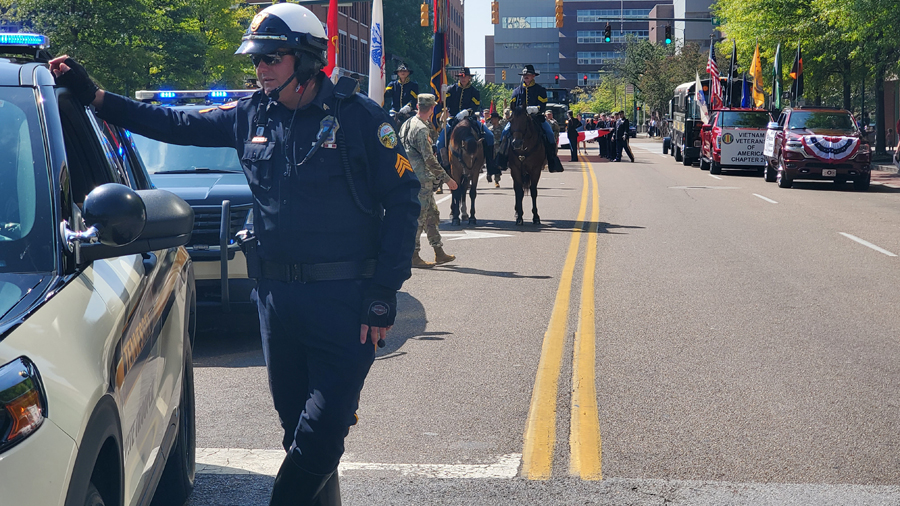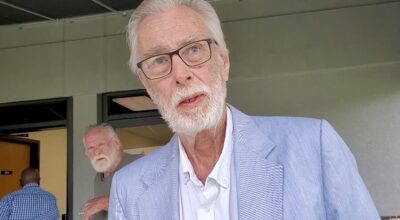
A Chattanooga city cop and a trooper inside a THP cruiser talk prior to a parade downtown. (Photo David Tulis)
CHATTANOOGA, Tenn., Monday, Aug.12, 2024 – The federal government, for its many faults, is often less beastly than the states who, in greed and malice, have converted themselves into its servants, aping and exaggerating its vices.
The U.S. government recognizes what we common folk often call “the right to travel,” which right officials in Tennessee denounce as a myth, a gloss generated by the imaginations of a few cranks.
The code of federal regulations (the CFR) gives a nod to this right that pre-exists any state, any constitution, any kingdom or government and inheres in each man and woman among God’s creation. A right exercised under orders from God by Abram travel away and leave the Chaldee. It’s not a forthright expression, but a slight dip of the head.
Exceptions. Unless otherwise specifically provided, the rules in this subchapter do not apply to
***
(3) The occasional transportation of personal property by individuals not for compensation and not in the furtherance of a commercial enterprise;
49 C.F.R. § 390.3(e)(3)
Let’s just pause for a moment and say, “wow.”
This provision is an exception in a subchapter the rules of which “are applicable to all employers, employees, and commercial motor vehicles that transport property or passengers in interstate commerce.” You can find it here at Cornell’s law website.
https://www.law.cornell.edu/cfr/text/49/390.3
Transportation rules apply to people who have a calling or vocation in the business of using the roadways for hire and private profit and gain.
I won’t release you from a claim I make here upon you. I insist.
If we understand the fraud behind “TN traffic tickets” and suchlike in your state we can defeat greater frauds as they come our way (think: “Covid-19”). The “good people” impose these scams by edict, emergency order, threat and voluntary inducement. My unique response to CV-19 fraud eluded dozens of other people – lawyers – who sued to block emergency controls by firing their legal tracers at boxcars. I lost for “lack of standing,” but I fired at the locomotive.
TAKEAWAY
— Revoked tag, expired license not sins, not harms
— If accused not in commerce, can cite federal protections
— Cops, deputies serve as collectors for commercial, municipal government
— All traffic cases are civil, administrative, subject to uniform administrative procedures act
If we can catch “the good people” at their game of oppressing all poor people (low income, aliens and strangers, orphans and widows – the biblically specially protected groups) and everybody else in the use of their private autos, we’ll make major Christian reconstructive strides toward to defeating commercial government and defanging its snarling dogs.
Tennessee government – thanks to the judicial trickery in State v. Booher, 978 S.W.2d 953, 955 (Tenn. Crim. App. 1997) with its miracle sentence – pretends not to recognize the right of movement. Booher is the source of what has become a legal fiction statewide. The sentence written for purpose of being misread by every DA and assistant district attorney in the state is, indeed, read as the judges intended. Judicial and prosecutorial consensus is, thusly, there is no right to travel in Tennessee. ‡
Traffic cases at heart are tax cases, privilege management civil claims and can be defeated on grounds of disregard of administrative rules.
These rules are what’s called the UAPA, the uniform administrative procedures act at Tenn. Code Ann. 5, chapter 4. They require the moving party to exhaust its administrative remedies before “adjudicating” a grievance. Meaning, the state has to have a contested case hearing – a civil jurisdiction dispute – in agency of “the DMV,” which in Tennessee is the department of safety and homeland security.
To insist on this right will probably force the overworked ADA who has your nothingburger criminal case to insist on dropping it, and her supervisor or the DA her- or himself will agree to simply drop the matter. Too messy. Too time consuming. “We don’t want to go there.” “We don’t want this guy to appeal this issue, because we won’t hear the end of it.
The UAPA analysis work for me. I call it “the Russell Remedy” after a young dissenter midstate, in Gallatin, Sumner County, woth whom I put on the table the legal puzzle parts. Here’s a link to “the Russell Remedy” that is my filing in Hamilton County, Tenn., general sessions court December 2023.
Public, private distinction
The federal right has other props, namely how Uncle Sam clearly sees the distinction between private travel and for-hire use of the road.
What is commerce?
1: §382.107 Definitions (Code of Federal Regulations)
Commerce means:
(1) Any trade, traffic or transportation within the jurisdiction of the United States between a place in a State and a place outside of such State, including a place outside of the United States; or
(2) Trade, traffic, and transportation in the United States which affects any trade, traffic, and transportation described in paragraph (1) of this definition.
The Tennessee code says likewise. Federal tongue is sometimes a bit thick, but here’s more. Notice the word “traffic.” As in, “traffic stop.”
Interstate commerce means trade, traffic, or transportation in the United States—
(1) Between a place in a State and a place outside of such State (including a place outside of the United States);
(2) Between two places in a State through another State or a place outside of the United States; or
(3) Between two places in a State as part of trade, traffic, or transportation originating or terminating outside the State or the United States.
49 C.F.R. § 390.5
Tennessee, an especially crooked operation, hides the truth behind a powerful tool called vagueness. But the feds tell the story straight.
“(17) Driver means every person who drives or is in actual physical control of a motor vehicle upon a highway or who is exercising control over or steering a vehicle being towed by a motor vehicle.” Tenn. Comp. R. & Regs. 1340-01-13-.02
Uncle, hoping to teach good morals, as it were, is more to the point. You may have to strain your eyes, and blink several times, to see him bearing glad tidings.
Driver means any person who operates any commercial motor vehicle.
49 C.F.R. § 390.5 (emphasis added)
Employee means any operator of a commercial motor vehicle, including full time, regularly employed drivers; casual, intermittent or occasional drivers; leased drivers and independent, owner-operator contractors (while in the course of operating a commercial motor vehicle) who are either directly employed by or under lease to an employer.
49 C.F.R. § 383.5 (emphasis added)
Tennessee law is perfectly harmonized with the federal rules – so Gov. Lee and his successors can get fresh doses of “free money” from Uncle.
On driver licenses, state regulations note that every driver license – even Granma’s – is commercial, starting off as follows:
Tenn. Comp. R. & Regs. 1340-01-13-.01
Alternatively cited as TN ADC 1340-1-13-.01
1340–01–13-.01. PURPOSE.
To establish uniform standards and systems for administering Temporary Driver Licenses and Classified and Commercial Driver Licenses, as defined herein, under the provisions of T.C.A. §§
Tenn. Comp. R. & Regs. 1340-01-13-.01 (emphasis added)
Commerce is what troopers tax and regulate. Commerce is regulable by the U.S. congress, which operates in the states via the U.S. code and the code of federal regulations.
I plan to defeat traffic regime by administrative notice
Uncle recognizes highways as free and open, with limited restrictions.
Highway means any road, street, or way, whether on public or private property, open to public travel. “Open to public travel” means that the road section is available, except during scheduled periods, extreme weather or emergency conditions, passable by four-wheel standard passenger cars, and open to the general public for use without restrictive gates, prohibitive signs, or regulation other than restrictions based on size, weight, or class of registration. Toll plazas of public toll roads are not considered restrictive gates.
390.5 Definitions.
The troopers are the sole lawful authority to regulate commerce on Tennessee roads. Municipal corporations often adopt rules of the road that THP officers administer, converting state privilege provisions into city ordinances. Ordinances apply only upon those who belong in that corporation by privity, or legal connection. Privity is usually established by residency and its proofs (water bill, electricity bill, sewer invoice, Internet bill, driver license address). Rules of the road so adopted apply only to residents (enfranchisees, aka voters).
State of Tennesse is so wiley that it tries to make you think some licenses are NOT commercial. State bureaucrats write this:
Applicants for commercial driver licenses, non-commercial driver licenses [and other types] shall complete in full an application prior to the issuance of such licenses and permits.
Tenn. Comp. R. & Regs. 1340-01-13-.11.
All licenses are commercial. Because the name of the statute is the classified and commercial driver license law of 1985. When Grandma gets or renews a driver license, that’s because she agrees that she’s in the trucking trades and needs to be under privilege.
Footnote
‡ Travel, in the constitutional sense, however, means more than locomotion; it means migration with the intent to settle and abide. Id. Thus, any American is free to travel from state to state, and to change his state of residence or employment whenever he desires, unrestricted by unreasonable government interference or regulation. Booher at 955


And there is this:
https://wearechange.org/u-s-supreme-court-says-no-license-necessary-to-drive-automobile-on-public-highwaysstreets/
You guys clearly misunderstand the law. You start by quoting 49 CFR 390.3 which begins by stating that “(a) The rules in subchapter B of this chapter are applicable to…” therefore, that definition of ‘driving’ (or the exceptions that are not considered driving) are ONLY in relation to subchapter B of the transportation act.
It doesn’t apply to any state laws or any other federal laws.
That’s how law works. And you might try and retreat to the supremacy clause but that’s nonsense.
The start of the exceptions section makes it clear, “the rules IN THIS SUBCHAPTER do not apply to…” (caps added by me). This means that these exceptions apply only to the rules included in 390.3, not to all state laws and not to other federal laws.
This is basic stuff. PLEASE DO NOT listen to this nonsense. It will get you fined, it will get you arrested. It needs to be scrubbed from the interenet.